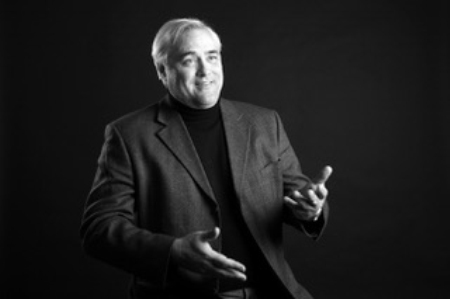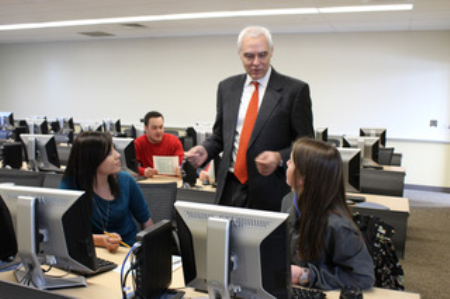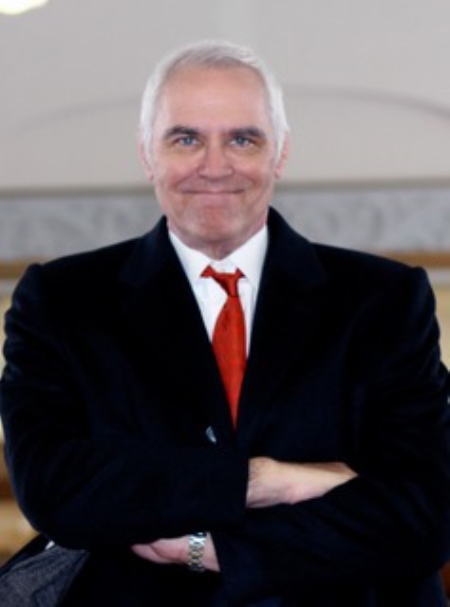Passionate About Accountancy
A brief conversation with Paul Gills, ex-PwC
By Mike Cormack
 如果你搜索有关“审计”、“概念股”等金融业专业术语,往往会看到各大时评中引用普华永道前合伙人保罗•吉尔斯(Paul Gills)的评论见解。拥有多年金融业工作经验的他现任北京大学访问教授。我们荣幸与吉尔斯教授近距离接触,了解他在金融领域的精彩人生。
如果你搜索有关“审计”、“概念股”等金融业专业术语,往往会看到各大时评中引用普华永道前合伙人保罗•吉尔斯(Paul Gills)的评论见解。拥有多年金融业工作经验的他现任北京大学访问教授。我们荣幸与吉尔斯教授近距离接触,了解他在金融领域的精彩人生。
有时候,一个机缘可以改变某个人未来的人生轨迹,吉尔斯就是这样的。在报选大学专业时,他最初打算学地质学,但参加了一个会计课后,他改变了自己的想法,于是一路从会计学学士读到税务硕士。毕业时,恰逢美国70年代左右,当时还有8家大型会计事务所,经过多轮合并后成为了四个,他加入了其中最小,但最具潜力的一家——Price Waterhouse(普华永道),因为这里有最好的客户资源,付费最高的合作伙伴。
在50岁事业有成后,保罗•吉尔斯从普华永道提前退休,而后回到神学院学习神学,并继续在会计领域深造。在这个普通人开始颐养天年的年纪,他则攻读博士学位,并于当年赢得了EMFD和EQUIS颁发的最佳博士论文奖。
吉尔斯最早被普华永道派至新加坡工作,在海外的工作时间基本占去了其职业生涯的一半。而后普华永道派遣他来到中国工作,当时是1997年,PWC在中国只有500名员工,而今,这一规模已经超过了一万名。在北大任教期间,他主要针对MBA学生开设课程,不仅有中国学生,甚至还有不少外国学生。
最近,他还成为了美国公众公司会计监督委员会(PCAOB)常务咨询组成员,负责就制定审计准则提供咨询与意见。
谈及四大会计事务所——德勤、普华永道、安永、毕马威在中国的表现,吉尔斯说这四大巨头都在中国取得了不错的成绩,表现良好。目前,普华永道仍然是中国最大的会计事务所,同时令两家国内本土事务所已攀升至第二及第三名。四巨头在跨国公司和在海外上市的中国企业中发展不错,但在本土企业方面表现不佳。更多深入见解,不妨细细阅读下文,查看我们这位会计业元老的精彩问答。
 What drew you to accountancy in the first place - were you particularly business-oriented or numerate as a high school student, for example? Did you specialize in tax?
What drew you to accountancy in the first place - were you particularly business-oriented or numerate as a high school student, for example? Did you specialize in tax?
When I started college I planned to major in geology, but took an elementary accounting class and it really appealed to me. I never did take a class in geology, and accountancy became my passion. After an undergraduate degree in accounting, I did a master in tax and then joined Price Waterhouse.
Can you describe the accounting industry in the mid 1970s, when you first qualified? Which were the main firms at the time and what were their reputations/specializations? (I’m not sure when they all merged into the Big 5 etc). And how did it all work without Excel?
When I came out of school there were still eight large accounting firms that later merged and came down to five and then became four when Arthur Andersen imploded. I joined the smallest firm – Price Waterhouse that had the biggest and best clients and the highest paid partners.
 Why did you go back to complete a PhD in computing in 2011? What was your PhD thesis on?
Why did you go back to complete a PhD in computing in 2011? What was your PhD thesis on?
I took early retirement from PwC at age 50, one of the great perks of the firm. I played a lot of golf, got my handicap way down, but then it became boring and work-like. So I went back to school, first to seminary to study theology. I very much enjoyed the academics and decided to get a PhD. I thought it would take too long to do a doctorate in theology so I went back to accounting. It still took the same amount of time. I did my thesis on the development of the accounting profession in China and the contribution of the Big Four. I won an award from EMFD and EQUIS for the best doctoral thesis that year.
What led you to work in Asia, and what was the time scale of you doing so? What professional and industry differences did you find in Singapore and China as compared to the US?
I was heavily recruited out of college, and narrowed it down to two choices. The United States Marines wanted to make me an officer and send me to Southeast Asia. Price Waterhouse’s recruiting brochure also promised that I could see the world, but without shooting anyone. So I joined PW and two years later was sent to Singapore. I ended up working in international tax for most part of my career and lived abroad about half of it. I was sent to China by PW because in 1997 it appeared to be the next big thing. PW had about 500 people in country when I arrived. Today they have over 10,000 so it was the next big thing.
China is new to professional accounting. While China quickly adopted most international accounting and auditing standards, one of the bigger challenges has been adapting those standards to Chinese business practices.
What do you teach at Peking University? Is this relevant to Chinese or international students?
I have taught at Peking University for ten years now. Most of my classes today are for MBA students. About half the students are Chinese and the rest come from all over the world. Many foreign students study in China – some on exchange for a semester and others for their whole MBA degree.
How successful have the Big 4 been in China? Are there any domestic competitors?
The Big Four have been very successful in China, building huge practices. Local firms have been doing better in recent years. Today, PwC is still the largest accounting firm in China, but two local firms (affiliated with second tier international firms) have climbed into second and third place, with the other Big Four firms trailing. The Big Four prospered with multinationals and overseas listed Chinese companies, but have done poorly with listings on China’s stock exchanges.
 Does the partnership structure of the Big 4 let them fully localize in China? How does it work structurally or legally?
Does the partnership structure of the Big 4 let them fully localize in China? How does it work structurally or legally?
The Big Four expanded in China using joint ventures with state controlled CPA firms. A few years ago the Big Four were required to restructure into limited partnerships with local control. In practice, however, the firms tend to run China, Hong Kong, and often other Asian locations as a single practice.
Are Chinese enterprises which float in the NYSE or the NASDAQ able to cope with the rigors of the PCAOB? What are the issues for Chinese enterprises in terms of their disclosures?
Chinese companies that list in the US are usually audited by the Big Four or US CPA firms, although the only requirement is that the auditor should be registered with the PCAOB, which is the regulator of auditors of US public companies. China has blocked the PCAOB from inspecting the work of Chinese auditors (including the Big Four in China). That has weakened investor protection and has created tension between the countries. China is concerned that allowing foreign regulators to inspect the work of Chinese accountants would impinge on its national sovereignty and could also possibly reveal state secrets.
 With Wanda and HNA being forced to fire-sale assets, how are their audits getting passed?
With Wanda and HNA being forced to fire-sale assets, how are their audits getting passed?
Wanda is audited by EY and HNA by PwC. A fire sale of assets does not prevent audits getting done. The auditors will assess whether the companies are going bankrupt, which basically involves assessing whether they have enough liquidity to last another year.
Congratulations on having become a Member of the Standing Advisory Group of the PCAOB - What does this involve?
I was on the Standing Advisory Group for two years. The primary responsibility of the group is to advise on the setting of auditing standards. I was more involved in the issues related to China. I have also testified twice before the US China Security and Economic Commission about the problems with Chinese companies listed on US exchanges.